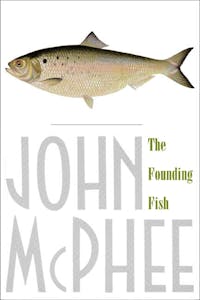The Founding Fish
 Download image
Download image
ISBN10: 0374528837
ISBN13: 9780374528836
Trade Paperback
368 Pages
$25.00
CA$33.00
A New York Times Notable Book
The Founding Fish, John McPhee's twenty-sixth book, is a braid of personal history, natural history, and American history, in descending order of volume. McPhee is a shad fisherman. He waits all year for the short spring season when delicious American shad—Alosa sapidissima—leave the ocean in hundreds of thousands and run up rivers heroic distances to spawn. He approaches them with a catch-and-eat philosophy. After all, their specific name means "most savory."
McPhee presents his obsession in bold and spirited prose. His research illuminates the sometimes surprising relevance of this fish in seventeenth- and eighteenth-century America, and its unique appeal to imaginative historians. George Washington was a commercial shad fisherman—in 1771 he caught 7,760 American shad. The fish had a cameo in the lives of Henry David Thoreau and John Wilkes Booth. Planked shad (shad nailed to a board and broiled before an open fire) was invented by the Colony in Schuylkill, a Philadelphia fishing club founded in 1732, which now considers itself the fourteenth of the fifty-one united states.
McPhee fishes with and visits the laboratories of various ichthyologists, including a fish behaviorist and an anatomist of fishes, he takes instruction in the making of shad darts from a master of the art; and he cooks shad and shad roe in a variety of ways, delectably explained at the end of the book. Mostly, though, he goes fishing for shad in various North American rivers—in Florida, in Maritime Canada, but especially in the Delaware River, nearest his home, where he stands for hours in stocking waders and cleated boots, or seeks pools below riffles and rapids in a canoe. His adventures in pursuit of shad occasion the kind of writing—expert and ardent—at which he has no equal.
Reviews
Praise for The Founding Fish
"The Founding Fish is . . . far more than a fishing book. It is a mini-encyclopedia, a highly informative and entertaining amalgam of natural and personal history, a work in a class by itself."—Robert H. Boyle, The New York Times Book Review
"Under McPhee's close eye, everything about this fish is fascinating."—William Moody, The Christian Science Monitor
"There are many descriptions one might give to the writing of Pulitzer Prize winner McPhee—entertaining, wry, surprising, inventive—but the quality most prominently on display in his newest work is uncompromising thoroughness. The book recounts the complete history of the delicious fish known as the shad—not just of hunting, cleaning and eating the fish, but of the famous men who caught it (William Penn, George Washington and Abraham Lincoln among them), the writers who penned heartfelt tributes to it, the biologists and ichthyologists who try to uncover its secrets and the animal activists who fight on its behalf. It is likely that no one will ever write another book quite like this one, a book that manages to relate every possible snippet of shad lore while at the same time offering up humorous tales of the author's own fishing expeditions. The book will no doubt emerge as a must-read for those already enamored of shad. For the rest of us, it serves as an example of nonfiction writing at its finest—intimate and suggestive, authoritative and convincing."—Beth Kephart, Book
"Suitably, and lucky for readers, there isn't a dry patch in this story of a fish and its homewaters. It's owlish, reflective, full of sustaining information you had no idea you wanted to know, but also warm and full of McPhee, a shad fisherman, with rod and dart and fly, of long standing . . . Readers tending toward hard science will be pleased with the clear-minded icthyological material, while those whose slant is more in the direction of humanities will graze enjoyable on the historical and anecdotal parts."—Kirkus Reviews
"McPhee is in great form here, as informative as always but also funny, unusually self-revealing, and quite passionate in his discussions of the dire effects dams have had on shad and rivers alike, and the troubling realization that catch-and-release fishing 'may be cruelty masquerading as political correctness.'"—Booklist
"McPhee reaffirms his stature as a bold American original. His prose is rugged, straightforward and unassuming, and can be just as witty. This book sings like anglers' lines cast on the water. It runs with the wisdom of ocean-going shad."—Publishers Weekly
Reviews from Goodreads
BOOK EXCERPTS
Read an Excerpt
They're in the River
I hadn't been a shad fisherman all my days, only seven years, on the May evening when this story begins -- in a johnboat, flat and square, anchored in heavy current by the bridge in Lambertville, on the wall of...
About the author
John McPhee
RELATED
The Mind of John McPhee: Feature Article, The New York Times Magazine



